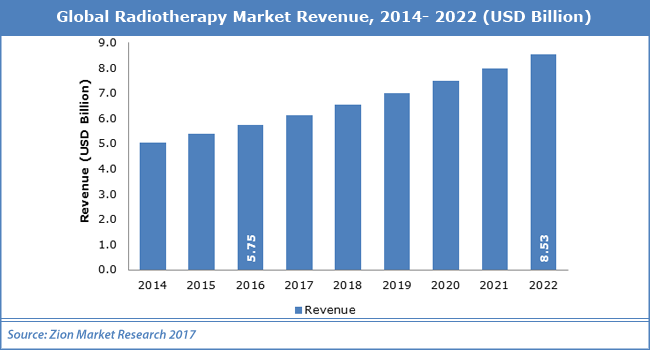Cancer can be defined as uncontrolled growth of the cell. Cancer starts when cells grow out of control and outnumber normal cells. Uncontrolled growth of cell leads to the formation of the tumor which can interfere normal cell functioning. Radiation therapy uses high-energy X-rays to destroy or injure cancer cells and to cease the growth. Radiation therapy can be used to treat cancer. About 4 out of 10 people with cancer (40%) have radiotherapy as part of their treatment. It is given in various ways, from outside the body as external radiotherapy, using X-rays from linear accelerator machines, electrons, and more rarely other particles such as protons and from within the body as internal radiotherapy, by drinking a liquid that is taken up by cancer cells or by putting radioactive material in, or close to, the tumor.
According to the American Cancer Society, cancer is the second most common cause of death in the U.S. and accounts for nearly 1 of every 4 deaths. The World Health Organization estimates that, worldwide, there were 14 million new cancer cases and 8.2 million cancer-related deaths in 2012. There are over 200 different types of cancer and each of which is classified by the type of cell that is initially affected. Various types of cancer include prostate cancer, blood cancer, lungs cancer etc. The treatment of cancer has become of prime importance owing to increase in a number of global cancer patients. Different types of drugs are administered to cancer patients depending upon therapy used to treat the patient and type of cancer.

Increasing prevalence of cancer across the globe is expected to be the major driver for the global radiotherapy market. In addition, increasing geriatric population coupled with large government funding is expected to trigger the growth of global radiotherapy industry in the coming years. However, lack of infrastructure coupled with the lack of skilled personnel and training may pose the challenge to radiotherapy market. Nevertheless, technological advancements in radiotherapy products coupled with the huge investment in radiotherapy across the globe are expected to act an opportunity for radiotherapy market in near future.
Based on product, radiotherapy market has been segmented into external beam radiation therapy, internal radiation therapy (brachytherapy), and systemic radiation therapy. External beam radiation therapy is further sub-segmented into compact advanced radiotherapy systems (Cyberknife, Gamma knife, and Tomotherapy), proton therapy systems (Cyclotron and Synchrotron) and electron emitting high energy linear accelerators (Linac). Internal radiation therapy is further sub-classified into seeds, applicators & after leaders and electronic brachytherapy. External beam radiation therapy holds the maximum share of global radiotherapy market.
Based on technology radiotherapy market is classified into external beam radiation therapy (Image-Guided Radiotherapy (IGRT), Intensity Modulated Radiotherapy (IMRT), Stereotactic Technology, Proton Beam Therapy, Tomotherapy, 3D Conformal Radiotherapy (3D CRT) and Volumetric Modulated Arc Therapy (VMAT)), internal radiation therapy (Low Dose Rate and High Dose Rate), and systemic radiation therapy.
Based on applications external beam radiation therapy segment is classified into prostate cancer, breast cancer, lung cancer, head & neck cancer, colorectal cancer and other. Internal radiation therapy is classified into prostate cancer, gynecological cancer, breast cancer, penile cancer and other.
North America is expected to remain the dominant region over the forecast period. Increasing healthcare awareness is expected to boost the market in this region. Europe was the second largest market followed by Asia-Pacific. Asia-Pacific is expected to show fastest growth rate during the forecast period while Latin America market is projected to grow at a moderate rate during the forecast period. The Middle East and Africa are also expected to experience noticeable growth in the years to come.
Some of the key players in radiotherapy market include Elekta AB, Varian Medical Systems, Accuray Incorporated, IBA Worldwide, IsoRay Medical, Inc., Nordion, Inc., Raysearch Laboratories, Mevion Medical Systems, Mitsubishi Electric Corporation and C. R. Bard, Inc. among others.
